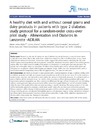Identificador persistente para citar o vincular este elemento:
https://accedacris.ulpgc.es/jspui/handle/10553/45686
| Título: | A healthy diet with and without cereal grains and dairy products in patients with type 2 diabetes: study protocol for a random-order cross-over pilot study - Alimentation and Diabetes in Lanzarote -ADILAN | Autores/as: | Fontes-Villalba, Maelán Jönsson, Tommy Granfeldt, Yvonne Frassetto, Lynda A. Sundquist, Jan Sundquist, Kristina Carrera-Bastos, Pedro Fika-Hernándo, María Picazo, Óscar Lindeberg, Staffan |
Clasificación UNESCO: | 32 Ciencias médicas 3206 Ciencias de la nutrición |
Palabras clave: | Protocol Random-Order Cross-Over Trial Type 2 Diabetes Mellitus Metabolic Diseases Dietary Intervention, et al. |
Fecha de publicación: | 2014 | Publicación seriada: | Trials | Resumen: | Background: Research on the role of nutrition in type 2 diabetes has largely focused on macro/micronutrient composition and dietary fiber intake, while fewer studies have tested the effects of differing food choice. Some observational studies and short-term intervention studies suggest that a food pattern mimicking the diet with which humans evolved positively influences glucose control and associated endocrine systems. Such a food pattern mainly differs from other common healthy food patterns in its absence of cereal grains and dairy products. The primary aim of this pilot study is to determine the effect of two healthy diets with or without cereal grains and dairy products on glucose control, while keeping participants' weight stable and other food parameters, such as macro/micronutrient composition, dietary fiber and glycemic load, the same in both diets.Methods/Design: We intend to include 15 adult patients with a medical diagnosis of type 2 diabetes mellitus with or without medication and with an increased waist circumference (>= 80 cm for women and >= 94 cm for men) in a random-order cross-over diet intervention study during two periods of four-weeks separated by a six-week washout period. Patients will be instructed to eat two healthy diets according to official dietary guidelines with respect to macro/micronutrient composition and fiber content, but differing in the type of food included, with one diet being without cereal grains and dairy products. Lunch will be served in a hospital kitchen for control of nutrient intake, while the rest of the meals will be eaten at home according to specific directions. The energy content of the diets will be individually adjusted to maintain a stable body weight during the two four-week intervention periods. Primary outcomes will be change in fasting plasma glucagon and fructosamine, while secondary outcomes include change in fasting glucose and glycated hemoglobin, glucose and glucagon response during oral glucose tolerance test, blood lipids, blood pressure, C-reactive protein, body composition, quality of life, subjective experience with the two diets, satiety scores and changes in medication.Discussion: Using these results, we will assess the need to conduct larger and longer studies with similar design. | URI: | https://accedacris.ulpgc.es/handle/10553/45686 | ISSN: | 1745-6215 | DOI: | 10.1186/1745-6215-15-2 | Fuente: | Trials [EISSN 1745-6215], v. 15, 2, (Enero 2014) |
| Colección: | Artículos |
Citas SCOPUSTM
1
actualizado el 08-jun-2025
Citas de WEB OF SCIENCETM
Citations
4
actualizado el 01-mar-2026
Visitas
59
actualizado el 27-jul-2024
Descargas
65
actualizado el 27-jul-2024
Google ScholarTM
Verifica
Altmetric
Comparte
Exporta metadatos
Los elementos en ULPGC accedaCRIS están protegidos por derechos de autor con todos los derechos reservados, a menos que se indique lo contrario.
